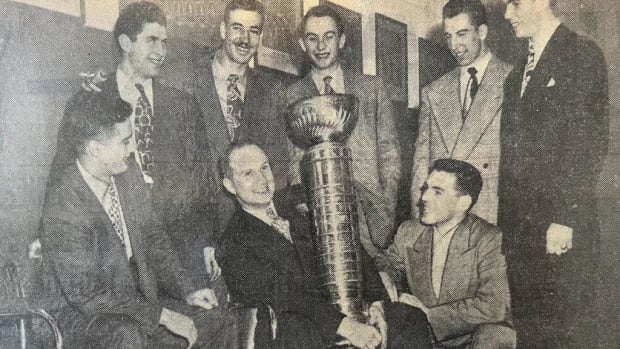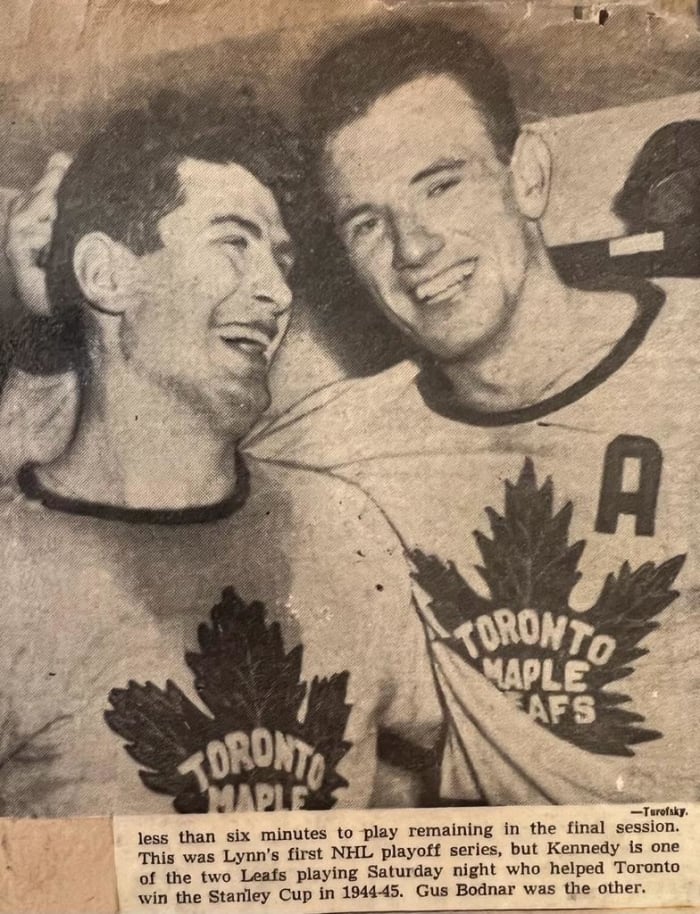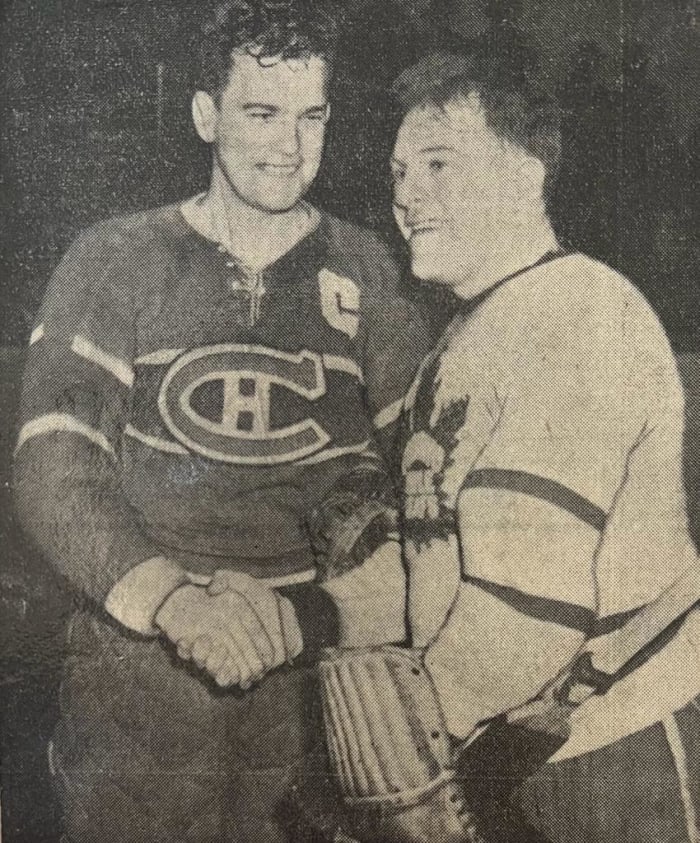Standing (left to right) Vic Lynn, Garth Boesch, Gus Mortson, Joe Klukay and Bill Barilko. Seated (left to right) Jim Thomson, Hap Day and Howie Meeker.
In the spring of 1947, three things seemed to have gone right for the Montreal Canadiens as they launched the defense of their Stanley Cup at the venerable Forum on the corner of Atwater and St. Catherine Street West in Habtown.
For starters, coach Dick Irvin’s club again finished first among the Original Six. Secondly, their supremely confident goaltender Bill Durnan boldly ridiculed his rookie-filled Toronto opponents, publicly commenting, “How did the Maple Leafs manage to get into the playoffs?”
And, third – to underline his point – the large puckstopper then went out and blanked Toronto while his mates drilled six hunks of vulcanized rubber past the Leafs stopper, Turk Broda, in Game 1 on April 8, 1947.
Of course, being a 15-year-old Leafs fan at the time, I was demoralized beyond all hope by the six-zip rout. I believed that Durnan had raised a good question about if my boys in Royal Blue and White really belong in such a terrific tournament.
But, like so many in the civilized hockey world of that bygone era, I had underestimated the Torontonians who had finished in second place, eight points behind the Champs.
Those vibrant challengers were coached by savvy Hap Day, a former crackerjack Leafs defenseman who had won Stanley Cups in 1942 and 1945 with the Hogtowners.
“We couldn’t have played much worse than we did in the (6-0) opener,” said Day. Or to re-define his behind-the-bench language, Day expected his lads to be better – much better – delivering their counterattack in the second game on Forum ice.
And they were.
Toronto’s affable Broda grounded the Flying Frenchmen, tossing a 4-0 goose egg in the return engagement. Then, for an encore, now at Maple Leaf Gardens, he backed his boys’ four goals by limiting Maurice Richard & Co. to just a pair.
“We’re winning,” explained Leafs boss Conn Smythe, “because we play a tough, aggressive game. It’s just the sort that goes best in a playoff where the players have no reason to save themselves. They know if they lose, they’re out.”
I was “in,” so to speak, since I was getting the “inside” story every day when my subscription copy of the Globe and Mail arrived in my mailbox – and only a day late at that. I devoured every playoff line of type and understood the strategy.
There was no question but that a prime factor in the series was goaltending as Broda outplayed the four-time winning Vezina Trophy-winner, Durnan, in Games 2, 3 and 4.
“Turk was a bloody marvel,” wrote right winger Howie Meeker in his autobiography, Golly Gee, It’s Me, “especially in those clutch games and key moments. He was as good as any who played the game.”
After taking a 3-1 series lead, the Leafs could have captured the Cup in Game 5 at the Forum. But Dick Irvin rallied his troops who extended the final with a 3-1 decision. Still, Toronto had the lead and the fresher stickhandlers.
What baffled the experts was coach Day’s ability to contain the mighty Canadiens offense with five rookie defensemen in his lineup. The quintet included Jim Thomson, Gus Mortson, Garth Boesch, Bill Barilko and Bob Goldham.
“The play of those lads was decisive,” Smythe insisted, “because they wanted to be champions.”
The Gardens was standing room only on the night of April 19, 1947 with the home club just one win away from what loomed as an enormous upset. But the crowd was stunned when Montreal’s crafty little center, Buddy O’Connor, beat Broda only 25 seconds into the first period.
Knowing that he had a younger, faster team, coach Day vigorously played his “Kid Line” of Ted Kennedy at center with Vic Lynn on the left side and Meeker on the right, and it was a wise move.
The pendulum swung Toronto’s way early in the second period. Kennedy and Meeker played tic-tac-toe with the biscuit, finally skimming the rubber to the burly Lynn, who buried it behind Durnan early in the second period. The Globe and Mail photo features two of the three “kids,” Lynn (left) and Kennedy (right).
From that point on, the game was up for grabs as the 1-1 tie lasted for more than 14 minutes into the third period. It was hockey melodrama at its finest – Broda versus Durnan, Day versus Irvin – and the fading champs against the brash underdogs.
The deadlock finally was broken by the Kid Line as Meeker and Kennedy strutted their stuff. Historian Eric Zweig noted in his oral history of the Leafs that, “Meeker set up Kennedy for the winner on a screened shot with just 5:21 remaining in the third. The Stanley Cup was coming back to Toronto.”
From that point on, Broda shut the door on Montreal’s vaunted Punch Line of Maurice Richard, Elmer Lach and Toe Blake. The game thrillingly ended 2-1 for the home team, which poured off its bench at the end like water over Niagara.
Naturally, I went nuts in my Brooklyn apartment as broadcast icon Foster Hewitt signalled the title win. Meanwhile, the press corps poured into the dressing rooms and later pounded away at their typewriters. My favorite journalist of them all, Globe columnist Jim Coleman, enjoyed a field day at the expense of the Habs goalie.
The little box in the middle of Coleman’s epistle had me smiling for days. As you can see above, it says the following.
“Famous Last Words’ Department: ‘How did the Maple Leafs manage to get into the playoffs?’ – Bill Durnan.”
The epitome of a sportsman, Durnan was captured by the cameras shaking hands with his adversary, Turk Broda.
Interestingly, the Stanley Cup was not on hand for a post-game celebration.
In those post-Second World War days, the then-tall, skinny hunk of silverware was kept in the NHL offices located at Montreal’s Sun Life Building. When the Cup finally arrived at Maple Leaf Gardens, a Toronto Telegram photographer captured a celebratory moment which is pictured at the top.
Meanwhile, the critics spent weeks debating how such an inexperienced bunch could dethrone one of the strongest NHL teams of all-time. Jim Coleman put it best:
“In the final analysis, the Leafs were the better team.” Then, a pause: “There’s no telling how good this Maple Leaf team may prove to be. They are youthful and inexperienced. They didn’t have a single man who won a place on the All-Star team.
“At the start of the season they had nothing to recommend them, apart from a lot of giddyap and combative spirit. They surprised their employers by being molded into a hockey machine a full two years ahead of schedule.”
Then, Coleman signalled who might have been the unobtrusive off-ice hero of them all.
“And we just happen to recall that Happy Day has won himself another Stanley Cup. That’s the third time that he has won the world championship since he succeeded Dick Irvin (in 1940-41) as coach of the Maple Leafs.”
And, oh, how I loved Coleman’s punch line:
“Not a bad record for a greenhorn!”






